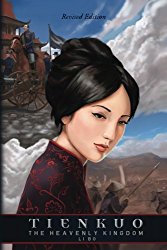 Having spent much of my adult life studying, teaching and writing about Asian Western relations I began some years ago to create a series of historical fiction novels designed to both entertain and educate readers on this critically important element of the modern world. The first novel in the series, Tienkuo The Heavenly Kingdom is a coming of age tale of a missionary’s son raised in Hong Kong in the 1850s who sets out to seek his fortune among the Chinese of the famous Heavenly Kingdom of Great Peace.
Having spent much of my adult life studying, teaching and writing about Asian Western relations I began some years ago to create a series of historical fiction novels designed to both entertain and educate readers on this critically important element of the modern world. The first novel in the series, Tienkuo The Heavenly Kingdom is a coming of age tale of a missionary’s son raised in Hong Kong in the 1850s who sets out to seek his fortune among the Chinese of the famous Heavenly Kingdom of Great Peace.
 The second novel in the series, Beyond the Heavenly Kingdom begins in 1870 as Jason Brandt, whose life we have followed in the first volume, sets out with his Chinese family to learn about the land of his birth about which he has no memory. Much of this novel, set in America in the 1870s, explores the evolution of American politics which ultimately resulted in the infamous Chinese Exclusion Act of 1882
The second novel in the series, Beyond the Heavenly Kingdom begins in 1870 as Jason Brandt, whose life we have followed in the first volume, sets out with his Chinese family to learn about the land of his birth about which he has no memory. Much of this novel, set in America in the 1870s, explores the evolution of American politics which ultimately resulted in the infamous Chinese Exclusion Act of 1882
Joint Review of both books in the Sino-American Series —
TIENKUO AND BEYOND: INTRIGUING STORIES AND LESSONS IN CHINESE-AMERICAN HISTORY
I love to read. In fact, I love to read every single day as a hobby and for relaxation. My favorite books are dramatic fiction and humor. I’m not a big fan of historical fiction nor of historical nonfiction. Even as a child, I was never a big history fan in school. History just kind of whizzed over my head. So, when I was provided with the books, Tienkuo: The Heavenly Kingdom and Beyond The Heavenly Kingdom, I was a little hesitant to dive in and read. They both tell of a story intertwined with Chinese-American history. However, I was pleasantly surprised. The author of both books, Li Bo, writes in such an engrossing style. I was quickly drawn into his story and rather enjoyed reading about his characters, namely an American journalist, Jason Brandt, and Black Jade, his wife.
TIENKUO: THE HEAVENLY KINGDOM
The first novel, Tienkuo: The Heavenly Kingdom, starts in China. Jason Brandt runs away to escape being sent off to college in America. He ends up following soldiers to the city of Guangzhou, where an attack is imminent. In Guangzhou, Jason eventually learns of a rebellion involving a man claiming to be Jesus Christ’s younger brother. The story continues with Jason trying to find the rebels’ capital, Taiping Tienkuo. Along the journey, the reader follows Jason’s transformation, struggles, and adventures, while learning about nineteenth-century China and its complex history.
BEYOND THE HEAVENLY KINGDOM
His second book in the series, Beyond the Heavenly Kingdom, starts with Brandt and his wife in China. It continues as they adventure to America, where they encounter intriguing historical figures, including Harriet Beecher Stowe, Mark Twain, and President Grant. They also, unfortunately, face tension, as many immigrants did during the time after the Civil War. What I like about Li Bo’s writing is how it tells a wonderful story that draws the reader in and, at the same time, it teaches his audience about history and culture. He inspired me to go beyond the book and research the historical events he wrote about because they were so fascinating (and some were hard to believe).
From Sing Tao Daily on my Sino-American Tales Series
ABOUT THE AUTHOR
Dr. Steven Leibo, writes under the pen name of Li Bo. He, himself, has an impressive background. Dr. Leibo is a professor of modern international history at the Sage Colleges in New York. He also serves as a research associate at the Fairbank Center on Chinese Studies at Harvard University. In my mind, the above certainly lends to his credibility as an excellent source for Chinese-American history and relations. In addition to being very knowledgeable about Chinese-American history, he knows how to tell a story that will hold a reader’s interest and inspire them to utilize their imagination and curious mind.
The third novel in the series Challenging the Qing is currently being written and covers the era from 1882 to 1900. This novel takes place both in the United States and China of that era and covers material from the evolving challenge by Han Chinese of the Manchu Qing Dynasty to efforts by Chinese Americans to fight anti-Chinese racism in the United States at late century.

